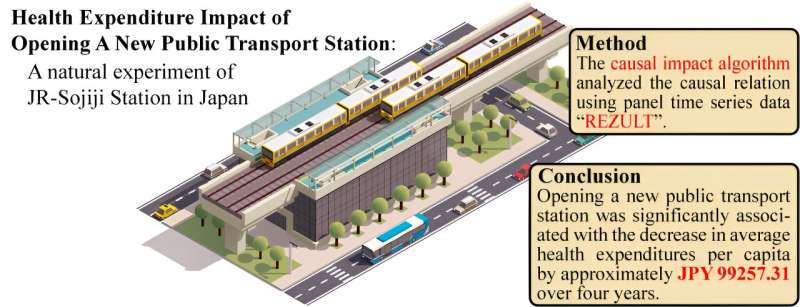This article has been reviewed according to Science X's editorial process and policies. Editors have highlighted the following attributes while ensuring the content's credibility:
fact-checked
trusted source
proofread
New transit station in Japan significantly reduces cumulative health expenditures

The declining population in Osaka is related to an aging society that is driving up health expenditures. Dr. Haruka Kato, a junior associate professor at Osaka Metropolitan University, teamed up with the Future Co-creation Laboratory at Japan System Techniques Co., Ltd. to conduct natural experiments on how a new train station might impact health care expenditures.
JR-Sojiji Station opened in March 2018 in a suburban city on the West Japan Railway line connecting Osaka and Kyoto. The researchers used a causal impact algorithm to analyze the medical expenditure data gathered from the time series medical dataset REZULT provided by Japan System Techniques. The findings were published in Journal of Transport & Health.
Their results indicate that opening this mass transit station was significantly associated with a decrease in average health care expenditures per capita by approximately 99,257.31 Japanese yen (USD 929.99) over four years, with US dollar figures based on March 2018 exchange rates. In addition, the 95% confidence interval indicated the four-year decreasing expenditure of JPY 136,194.37 ($1276.06) to JPY 62,119.02 ($582.02).
This study's findings are consistent with previous studies suggesting that increased access to transit might increase physical activity among transit users. The results provided evidence for the effectiveness of opening a mass transit station from the viewpoint of health expenditures.
"From the perspective of evidence-based policymaking, there is a need to assess the social impact of urban designs," said Dr. Kato. "Our findings are an important achievement because they enable us to assess this impact from the perspective of health care expenditures, as in the case of JR-Sojiji Station."
More information: Haruka Kato et al, Health expenditure impact of opening a new public transport station: A natural experiment of JR-Sojiji station in Japan, Journal of Transport & Health (2024). DOI: 10.1016/j.jth.2024.101808





















